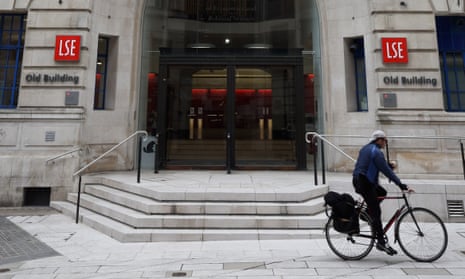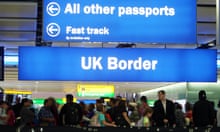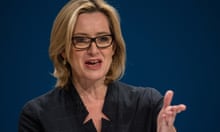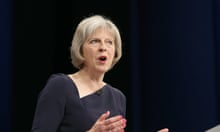Some of Britain’s world-renowned universities could lose their right to recruit as many international students as they want under new Home Office plans, vice-chancellors fear. Among those at risk are the London School of Economics, King’s College London and Bristol University.
The home secretary, Amber Rudd, used her maiden speech at the Conservative party conference last month to announce a crackdown on the number of overseas students coming to study in the UK, which will include different visa rules for “lower quality” universities and courses. There are fears it will use the government’s controversial new teaching rankings – expected to grade institutions “gold, silver or bronze” – to judge the “quality” of institutions.
The move, which vice-chancellors say they had been fearing since Theresa May became prime minister, has caused dismay in universities. According to Universities UK, the vice‑chancellors’ umbrella organisation, overseas students bring more than £10.7bn to the UK economy and non-EU international students make up 13% of universities’ revenues.
Colin Riordan, vice-chancellor of Cardiff University, says: “Trying to restrict the numbers of international students coming into this country because they contribute to migration numbers makes no sense. The British people don’t see students as migrants – or as a problem.”
He says stopping a university recruiting overseas students would “be an absolutely devastating blow”. “It would hugely reduce diversity, which really matters. It would reduce standards, as we need to recruit the best students wherever they are. And the financial effects would be serious – you would see wholesale job losses.”
Anxiety is escalating behind the scenes that the Home Office may want to use the Teaching Excellence Framework – the new system for ranking universities’ teaching – to decide which universities to cut. University heads warn this could have shocking unintended consequences, as some world-class research universities are not predicted to score well in the new teaching rankings.
The head of one Russell Group university, who asked not to be named, said: “Rudd’s speech was all about the quality of courses and institutions. How do you measure quality of teaching in a way that isn’t challengeable in the courts? You use the Teaching Excellence Framework. But some of the Russell Group do very badly on the TEF. And that means there is potentially a very big fight coming.”
Edward Byrne, president and principal of King’s College London, says King’s supports the TEF, but says: “There’s no rationale for linking it to the regulation of international student recruitment as it was not designed for this purpose. It would damage the UK’s attractiveness as a study destination in what is a very competitive global market place.”
King’s has high admissions standards that are equally rigorous for domestic and international students, he says. “Places at our institution are in great demand from students of outstanding quality around the world.”

Riordan says: “The TEF was never designed for this. It would be completely wrongheaded. Barely any of it refers to international students, who are mostly postgraduates.”
The TEF will rank university teaching based on factors including numbers of leavers who land graduate-level jobs and how students rate their institutions in the National Student Survey. This last measure is likely to hit some members of the Russell Group hard, because they have not scored well in the NSS in the past. This year the LSE, which consistently ranks highly in other league tables, dropped six percentage points in the NSS and was the lowest-performing major university, excluding small and specialist institutions. Any move to restrict LSE’s international recruitment could have a huge effect, as overseas students make up 70% of its student body.
Nick Hillman, director of the Higher Education Policy Institute thinktank, says the Home Office probably thinks using the TEF to judge quality is a “no-brainer”. Hillman, who negotiated with the Home Office about the importance of international students during his time as special adviser to former higher education minister David Willetts, says: “They know very little about universities. So piggybacking on an existing education department measure would seem to make sense.” He says the Home Office is rigidly elitist about higher education, and likely to be unaware of the potential impact of such a policy on some of Britain’s most famous institutions.
In her speech, Rudd insisted she was “passionately committed to making sure our world-leading institutions can attract the brightest and best”, but added that “a student immigration system that treats every student and university as equal only punishes those we should want to help”. Hillman, however, comments: “The “brightest and best language is really pernicious. They mean: ‘We don’t mind future world leaders like Bill Clinton coming here but we really don’t want anyone else.’”
Valerie Amos, director of Soas University of London, which is also expected to come some way down the TEF rankings because of its NSS results, says that although Soas is committed to the student experience and teaching quality, “I worry the TEF is a rather blunt instrument”. She adds: “I worry about the concept of differentiation. We are a diverse sector. Soas is a specialist, niche university. We don’t teach science and engineering. That means we don’t feature in certain rankings because of our size.”
The Home Office told Education Guardian: “We will be consulting on what more we can do to strengthen the system to support the best universities, and those that stick to the rules, to attract the best talent. The consultation will invite views on how courses and institutions could be differentiated and we will use the feedback to inform our decisions.”
Battle lines may be drawn next week when the issue is due to be debated by vice-chancellors at a board meeting of Universities UK. There is likely to be little schadenfreude. Vice-chancellors fear that if one institution suffers big cuts it could harm the reputation of the whole sector abroad, especially if that institution is one of the UK’s big hitters.
Dominic Shellard, vice-chancellor of De Montfort University, who has tweeted under the hashtag #loveinternational since the EU referendum, called a staff meeting after Rudd’s speech to denounce the “disturbing intolerance” coming from the Home Office. He warned that relationships were already being soured abroad, telling staff that the university’s India office had sent him a local news article with the headline “Five reasons to revisit your UK college plan”.
Shellard said: “Last week the Turner prize winning artist and De Montfort University graduate David Shrigley unveiled his new sculpture on Trafalgar Square’s fourth plinth: it was a giant thumbs up. After Ms Rudd’s speech it may well appear to the world that we are showing a very different finger. Because you can’t use the kind of rhetoric that we have seen idly. Words remain.”









Comments (…)
Sign in or create your Guardian account to join the discussion